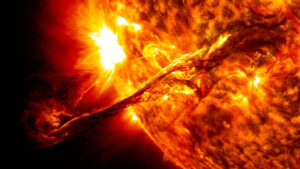Air Force taps Applied Technology Associates and Teledyne Brown to produce space weather sensors

SAN FRANCISCO – The U.S. Air Force awarded contracts to Applied Technology Associates and Teledyne Brown Engineering to manufacture satellite instruments to detect Energetic Charged Particles (ECPs).
The Air Force awarded a $5 million contract to Applied Technology Associates of Paso Robles, California, to assemble a sensor developed by the Air Force Research Laboratory. The sensor, Compact Environmental Anomaly Sensor 3, includes two particle telescopes to “provide a comprehensive measure of the space environment,” Capt. Kaitlin Toner, Air Force Space and Missile Systems Command spokeswoman, said in an emailed response to SpaceNews questions.
The Air Force also awarded a $1.8 million contract to Teledyne Brown Engineering of Huntsville, Alabama, to assemble ECP-Lite, a sensor developed by the Aerospace Corp. “ECP-Lite is a low size, weight and power sensor that will provide a focused subset of space environmental data,” Toner said.
The contracts, announced in January on the Space Enterprise Consortium website, are part of the Air Force’s effort to improve space weather monitoring. Air Force Secretary Deborah Lee James issued a memo in 2015 calling for ECP sensors on all new Air Force satellites.
The Space Enterprise Consortium solicitation for ECP sensor bids said that after completion of the prototype contracts, the Space and Missile Systems Center “intends to award a follow-on production contract.”
“We’re looking at incorporating ECP sensors where it makes sense to provide better anomaly attribution,” said Maj. Janelle Jenniges, Air Force Space Weather Integration chief, said at the American Meteorological Society conference in Boston in January. “There are two charged particle sensors. We will evaluate the differences between them.”
The sensors built by Applied Technology Associates and Teledyne Brown Engineering are scheduled to be launched on different spacecraft in late 2020 and early 2021, Toner said. “Testing will occur within 12 months of launch,” she added.
from SpaceNews.com https://ift.tt/38Rpk2T
Comments
Post a Comment